Have you ever noticed your cat panting and wondered why? Unlike dogs, cats don’t typically pant to cool down. But before panicking about this unusual behavior, it’s important to understand the various reasons behind it.
Keep reading as we delve into all things cat-panting – from normal causes after strenuous playtime to more severe health-related concerns that warrant immediate attention.
Key Takeaways
- Cats pant to release heat from their bodies after exertion or when they’re hot, similar to humans sweating.
- Abnormal causes of cat panting include pain, respiratory illness (like asthma), heart failure, and ingested/inhaled objects.
- If your cat is panting along with difficulty breathing or other concerning symptoms, seek emergency veterinary care immediately.
- To calm a panting cat, create a calm environment and distract them with toys or treats.
Contents
What is Panting in Cats?
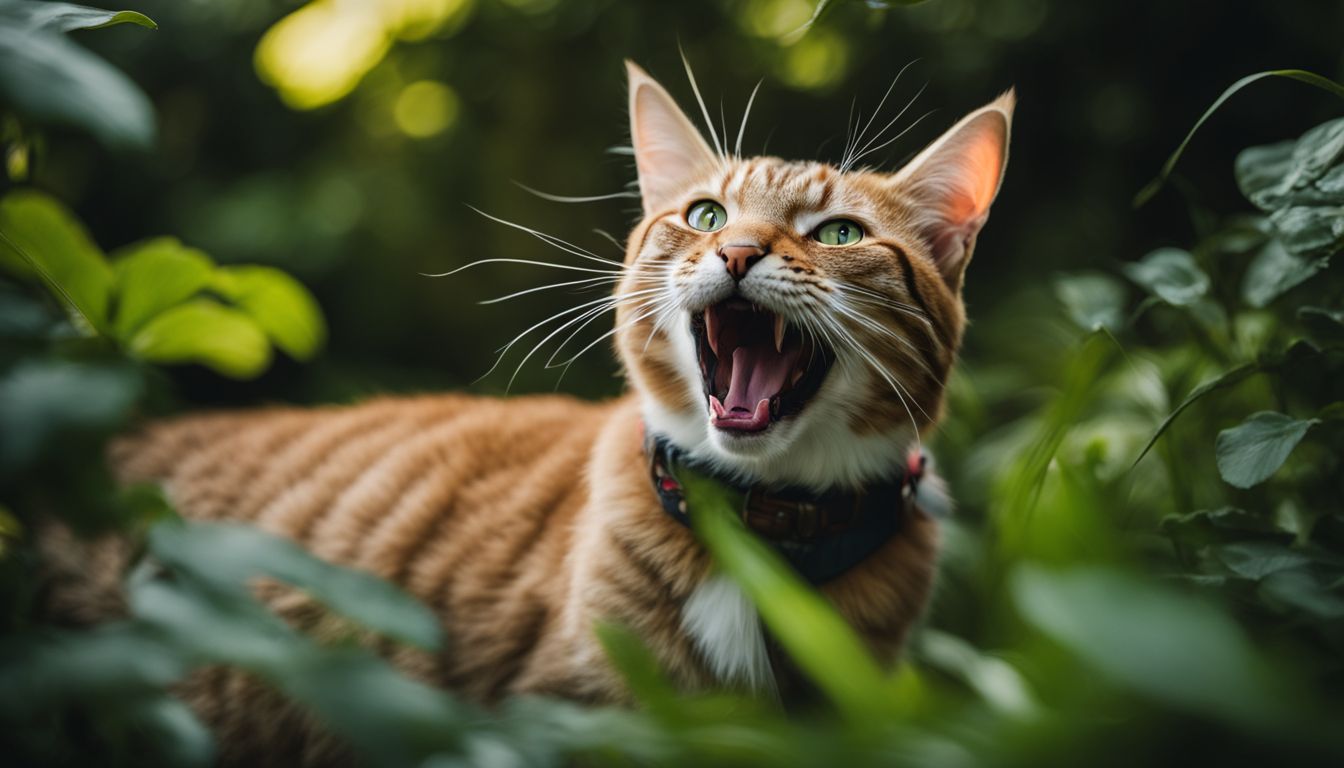 Panting in cats is a rapid, open-mouthed breathing that may be accompanied by an extended tongue.
Panting in cats is a rapid, open-mouthed breathing that may be accompanied by an extended tongue.
Definition and explanation
Cat panting is like fast breathing. It’s when your cat opens its mouth to let air out quickly. Most times, you can see a cat’s tongue sticking out during panting. Cats don’t do this often, like dogs do.
If your cat pants a lot, it might mean that something is not right with its health.
Normal Reasons for Cat Panting
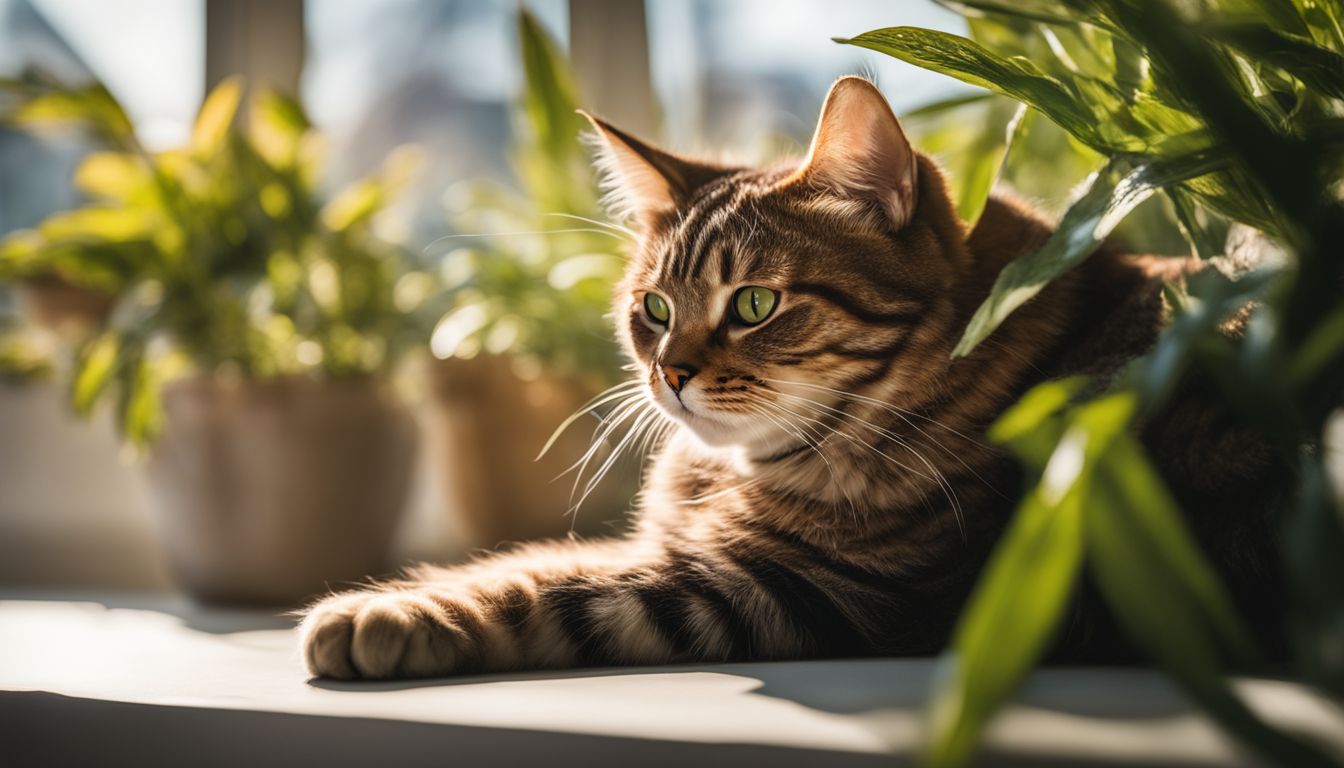
Cats may pant to release heat or after exertion. Understanding these normal reasons can help you determine when there is cause for concern. Read on to learn more about why cats pant and what it could mean for your furry friend’s health.
Releasing heat
Cats pant to cool down their bodies. Just like us, cats get hot too. They don’t have sweat glands all over their body. So, they use other ways to release heat. One of those ways is by panting or breathing fast.
This is seen when your cat is playing hard in the sun or staying in a warm room for a long time. It’s normal and no need for you to worry.
After exertion
Your cat may pant if it has been very active. Running and playing can make cats hot and tired. This is normal, like you after a hard workout. Do not worry! Just give your cat time to rest and cool down.
Abnormal Causes of Cat Panting
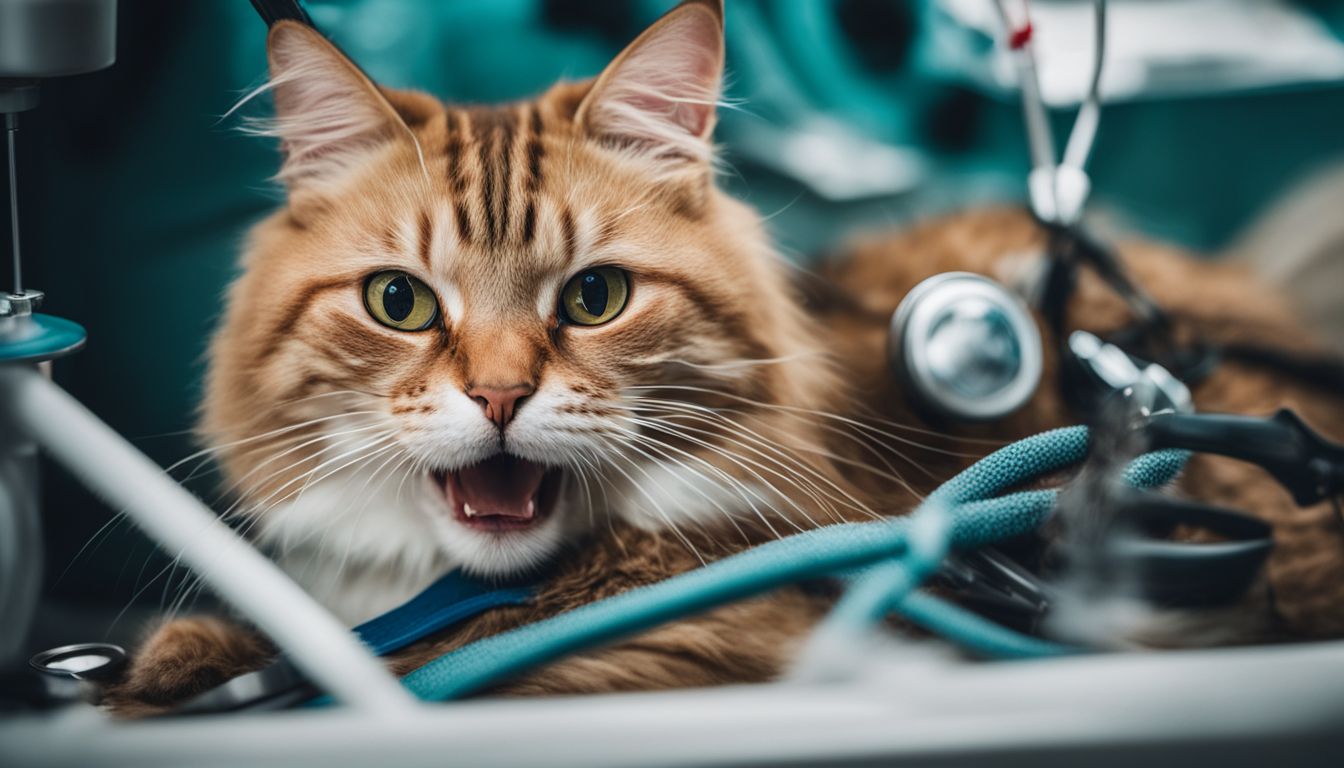
Cat panting can also be a sign of pain, respiratory illness, asthma, heart failure, or an ingested or inhaled object. Discover the potential causes and when to seek help for your cat’s panting.
Read more here..
Pain
One of the abnormal causes of cat panting is pain. If your cat is experiencing pain, it may start panting as a way to cope with discomfort. Pain can be caused by various factors such as injuries, illnesses, or underlying health conditions.
Cats are generally good at hiding their pain, so if you notice your cat panting along with other concerning symptoms like limping or decreased appetite, it’s important to seek veterinary help immediately.
The vet will be able to assess and identify the source of the pain and provide appropriate treatment for your furry friend.
Respiratory illness
Respiratory illness in cats is a serious concern that can cause panting. It may be due to conditions like asthma, infections, or even heart failure. If your cat is exhibiting abnormal panting along with symptoms like coughing or wheezing, it’s important to seek veterinary care immediately.
Your vet will be able to diagnose the specific respiratory condition and provide appropriate treatment to help your cat breathe easier and feel better.
Asthma
Asthma is a common respiratory condition in cats. It causes their airways to become inflamed and narrow, making it harder for them to breathe. Cats with asthma may have episodes of coughing, wheezing, and difficulty breathing.
This can be triggered by allergens such as pollen or dust mites. If you notice your cat having trouble breathing or making unusual sounds when they breathe, it’s important to seek veterinary care right away.
Your vet can help diagnose asthma and provide treatment options to keep your cat comfortable and improve their quality of life.
Heart failure
Heart failure is a serious condition in cats where their heart cannot pump blood effectively. This can lead to fluid accumulating in the lungs and other parts of the body, causing breathing difficulties.
Symptoms of heart failure in cats may include rapid breathing, coughing, wheezing, and panting. If you notice any of these signs, it’s crucial to seek immediate veterinary care for your cat.
Heart failure can be caused by various factors such as heart disease or high blood pressure. Treatment options will depend on the underlying cause and severity of the condition.
Ingested or inhaled object
Sometimes, cats get curious and end up swallowing or inhaling objects that they shouldn’t. This can cause panting as the object may become lodged in their airway or digestive tract, making it difficult for them to breathe properly.
If you suspect that your cat has ingested or inhaled something, it’s important to seek immediate veterinary care. The vet will be able to assess the situation and take appropriate action to remove the object if necessary.
It’s crucial not to delay seeking help in these situations as it could be a life-threatening emergency for your furry friend.
When to Seek Emergency Care for Cat Panting

If your cat is experiencing difficulty breathing, panting in unusual situations, or exhibiting other concerning symptoms alongside the panting, it is crucial to seek emergency care immediately.
Don’t hesitate to read on for more information on how to keep your feline friend safe and healthy.
Difficulty breathing
Difficulty breathing in cats is a serious concern that should not be ignored. If you notice your cat struggling to breathe, it could be a sign of a medical emergency. Rapid or labored breathing, gasping for air, wheezing, or panting with their tongue out are all signs that your cat is having difficulty breathing.
Other symptoms like coughing and lethargy can also accompany this problem. It’s crucial to seek immediate veterinary care if you observe any of these symptoms in your cat as prompt treatment can help prevent further complications and ensure your cat’s well-being.
Panting in unusual situations
Sometimes, cats may start panting in situations that aren’t typical for them. This can be a sign of distress or underlying health issues. If your cat is panting in unusual situations, it’s important to pay attention and take action if needed.
It could indicate that your cat is anxious or stressed, experiencing pain or discomfort, or dealing with respiratory problems like asthma. Other concerning symptoms may accompany the panting, such as wheezing, coughing, increased respiratory rate, or difficulty breathing.
If you notice these signs along with the panting, it’s best to seek emergency veterinary care right away to ensure your cat receives prompt treatment and support.
Other concerning symptoms
Other signs that may indicate a problem include:
- Labored breathing with the abdomen moving noticeably
- Bluish tint to the gums or tongue
- Coughing or wheezing sounds
- Rapid breathing even while at rest
- Changes in appetite or weight loss
- Lethargy or weakness
- Restlessness or pacing
- Hiding or seeking solitude more than usual
How to Calm a Panting Cat
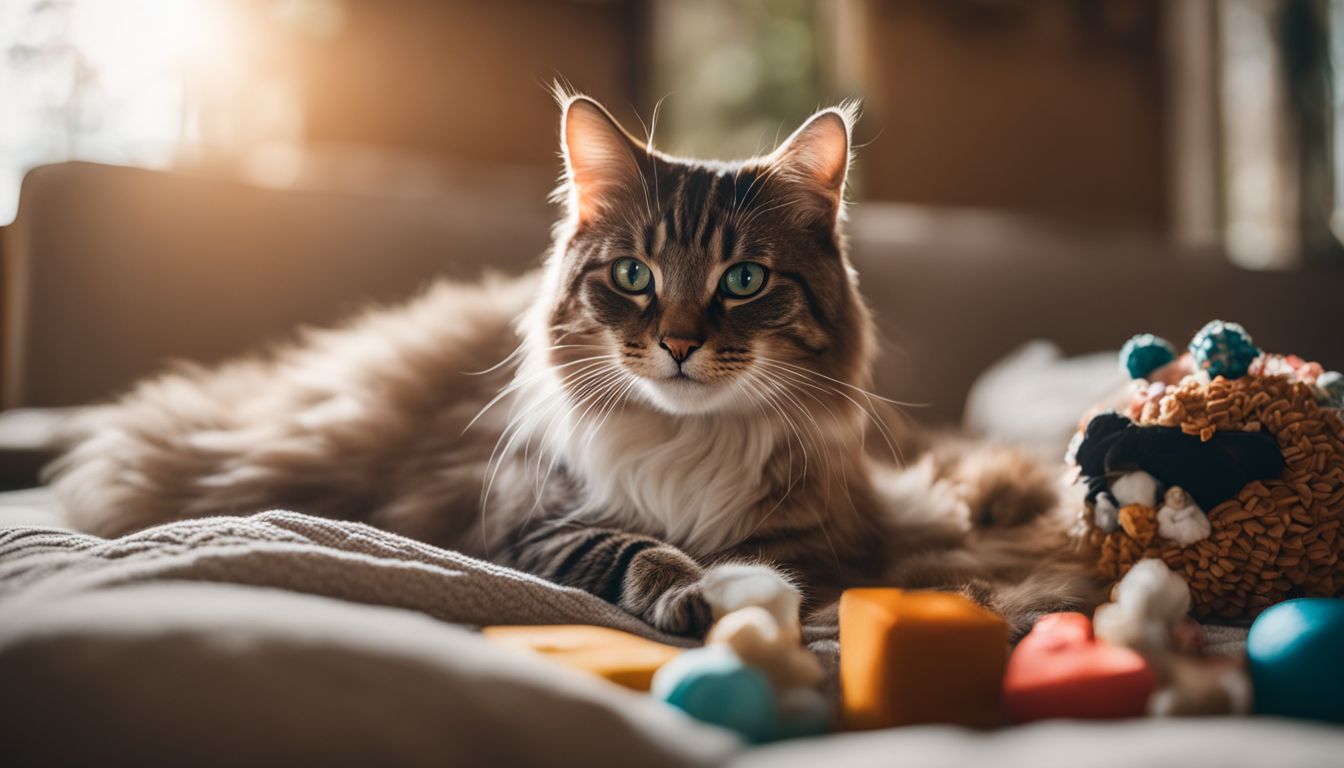
To calm a panting cat, create a calm environment and distract them with toys or treats.
Create a calm environment
To help calm a panting cat, it’s important to create a peaceful environment for them. Find a quiet and comfortable space where your cat can relax. Try to minimize loud noises and distractions that may be causing stress or anxiety.
Provide a cozy bed or blanket for them to rest on, and ensure they have access to fresh water and their favorite toys. By creating a calm environment, you can help soothe your cat and alleviate any unnecessary panting caused by stress or agitation.
Distract with toys or treats
If your cat is panting and you want to help calm them down, try distracting them with toys or treats. Playing with their favorite toy or offering a tasty treat can shift their attention away from whatever may be causing stress or anxiety.
By engaging them in play or providing positive reinforcement through treats, you can help redirect their focus and promote relaxation. This can be especially helpful if your cat tends to pant when they’re feeling nervous or overwhelmed.
Remember to choose safe toys and healthy treats for your furry friend!
Prevention of Cat Panting
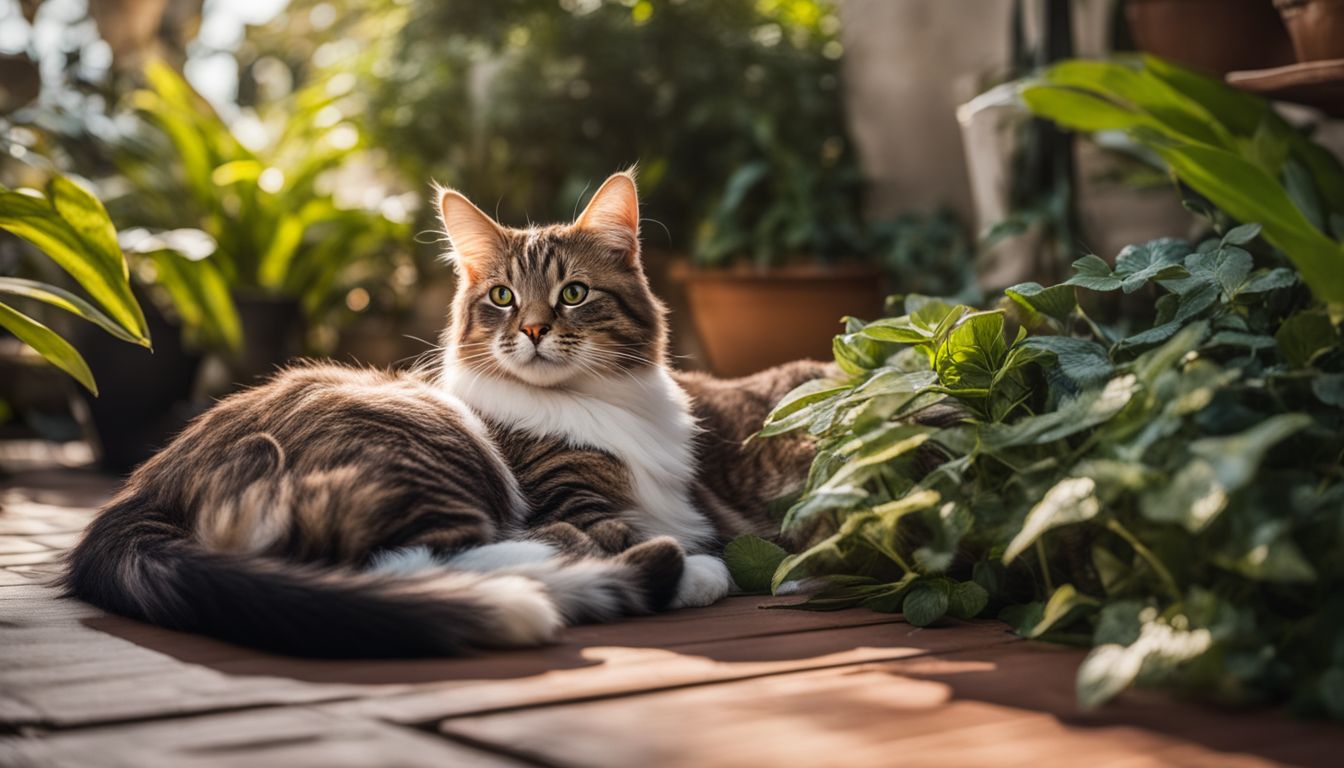
Prevent cat panting by ensuring they stay cool and hydrated, and monitoring for stress or anxiety triggers.
Keep cool and hydrated
To help prevent panting in cats, it’s important to keep them cool and hydrated. Make sure they always have access to fresh water and provide multiple water bowls throughout your home.
You can also place ice cubes in their water bowl or invest in a pet fountain to keep the water cool and enticing. During hot weather, create a comfortable environment by providing shade indoors and outdoors, using fans or air conditioning if possible.
Additionally, you can offer frozen treats or wet food with high moisture content to help keep them hydrated. Remember that cats may be less inclined to drink from stagnant water sources, so regularly changing their water will encourage them to stay hydrated.
Monitor for stress or anxiety triggers
Stress or anxiety can make your cat pant. It’s important to keep an eye out for triggers that might cause stress and try to minimize them as much as possible. Some common triggers include loud noises, changes in routine, new pets or people in the house, and visits to the veterinarian.
By keeping a close watch on these triggers and finding ways to reduce their impact, you can help prevent your cat from becoming stressed or anxious and avoid panting episodes.
Conclusion

Understanding why your cat is panting is crucial for their well-being. Panting can be normal, such as when they’re cooling down or after play. However, it can also indicate underlying health issues like pain, respiratory illness, asthma, or heart failure.
If your cat exhibits difficulty breathing or other concerning symptoms alongside panting, seek emergency care immediately. Creating a calm environment and monitoring stress triggers can help prevent excessive panting in cats.
Remember to keep your feline friend cool and hydrated to promote overall wellness.
FAQs
1. Why is my cat panting?
Panting in cats can be caused by various factors, including heat stress, anxiety or stress, respiratory issues, or underlying medical conditions.
2. Is it normal for cats to pant?
No, panting is not considered normal behavior in cats and could indicate an underlying issue that requires attention.
3. What should I do if my cat is panting?
If your cat is panting excessively or struggling to breathe, it’s important to seek veterinary help immediately as it may be a sign of a serious problem.
4. How can I keep my cat cool during hot weather?
You can keep your cat cool during hot weather by providing access to fresh water at all times, keeping them indoors with air conditioning or fans, and offering cooling mats or chilled surfaces for them to rest on.
5. When should I seek help for my cat’s panting?
If your cat’s panting persists for an extended period of time or is accompanied by other concerning symptoms such as lethargy, loss of appetite, coughing, or wheezing, it’s best to consult with a veterinarian for proper diagnosis and treatment.

